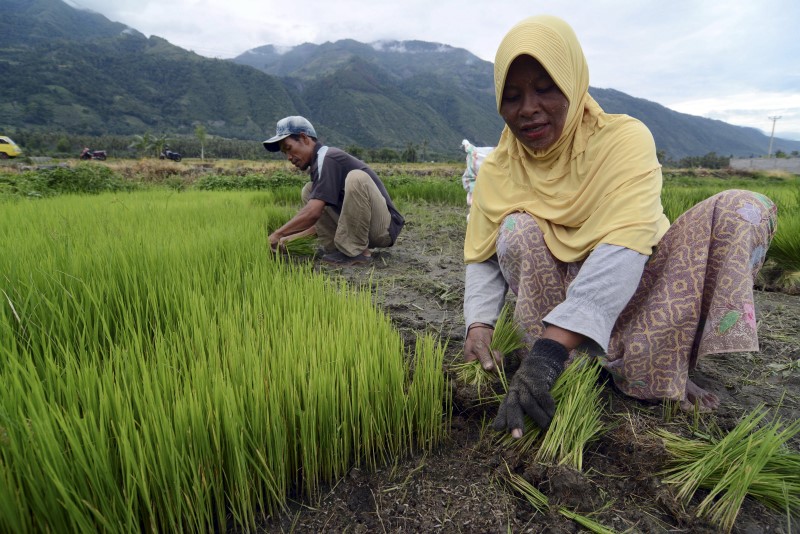MANILA, Nov 20 (Reuters) - Philippine President Rodrigo
Duterte has ordered a halt in rice imports after farmgate prices
of the staple fell more than a fifth during the last nine
months, hurting millions of farmers in the world's top buyer of
the grain.
The Philippines, which often buys rice from southeast Asian
neighbours Vietnam and Thailand, has imported 2.9 million tonnes
this year, more than double the annual average in recent years,
to dislodge China from the top spot among importers.
Duterte and Agriculture Secretary William Dar were set to
discuss the policy directive on Wednesday, a Department of
Agriculture spokesman said.
The suspension was necessary "because it is harvest time",
Duterte told a news conference late on Tuesday, without giving
a specific timeline or guidelines.
Duterte's directive also needs clarification as it is
unclear if the suspension can be legally imposed, after he
signed a law in February lifting curbs on rice imports.
Whether the halt will help lift farmgate rice prices, which
have fallen more than 20% over the last nine months, is another
question.
Rice imports surged after Manila lifted a two-decade-old cap
on annual purchases to replace it with tariffs at levels critics
called insufficient to protect farmers.
The Philippines' economic managers have rejected calls for
the repeal or review of the rice tariff law, which helped rein
in inflation to its lowest in more than three years by October,
from last year's highest level in nearly a decade.
The suspension may also prove unnecessary, as the volume of
rice imports dropped "drastically" in October to 85,000 tonnes
from a monthly average of 254,000 tonnes in the first nine
months, agriculture department data show.
Tighter food safety norms helped slow rice imports last
month, the department said.
"We will continue to be strict and continue to elevate (food
safety) measures before the issuance of sanitary and
phytosanitary import clearance," Dar said in a statement.
To appease farmers, Duterte said the government would buy
all their produce, even if prices are higher than usual.
- English (USA)
- English (UK)
- English (India)
- English (Canada)
- English (Australia)
- English (South Africa)
- English (Nigeria)
- Deutsch
- Español (España)
- Español (México)
- Français
- Italiano
- Nederlands
- Português (Portugal)
- Polski
- Português (Brasil)
- Русский
- Türkçe
- العربية
- Ελληνικά
- Svenska
- Suomi
- עברית
- 日本語
- 한국어
- 简体中文
- 繁體中文
- Bahasa Indonesia
- Bahasa Melayu
- ไทย
- Tiếng Việt
- हिंदी
Philippines' Duterte orders halt to rice imports as farmgate prices fall
Published 11/20/2019, 03:46 PM
Updated 11/20/2019, 03:48 PM
Philippines' Duterte orders halt to rice imports as farmgate prices fall

Latest comments
Install Our App
Risk Disclosure: Trading in financial instruments and/or cryptocurrencies involves high risks including the risk of losing some, or all, of your investment amount, and may not be suitable for all investors. Prices of cryptocurrencies are extremely volatile and may be affected by external factors such as financial, regulatory or political events. Trading on margin increases the financial risks.
Before deciding to trade in financial instrument or cryptocurrencies you should be fully informed of the risks and costs associated with trading the financial markets, carefully consider your investment objectives, level of experience, and risk appetite, and seek professional advice where needed.
Fusion Media would like to remind you that the data contained in this website is not necessarily real-time nor accurate. The data and prices on the website are not necessarily provided by any market or exchange, but may be provided by market makers, and so prices may not be accurate and may differ from the actual price at any given market, meaning prices are indicative and not appropriate for trading purposes. Fusion Media and any provider of the data contained in this website will not accept liability for any loss or damage as a result of your trading, or your reliance on the information contained within this website.
It is prohibited to use, store, reproduce, display, modify, transmit or distribute the data contained in this website without the explicit prior written permission of Fusion Media and/or the data provider. All intellectual property rights are reserved by the providers and/or the exchange providing the data contained in this website.
Fusion Media may be compensated by the advertisers that appear on the website, based on your interaction with the advertisements or advertisers.
Before deciding to trade in financial instrument or cryptocurrencies you should be fully informed of the risks and costs associated with trading the financial markets, carefully consider your investment objectives, level of experience, and risk appetite, and seek professional advice where needed.
Fusion Media would like to remind you that the data contained in this website is not necessarily real-time nor accurate. The data and prices on the website are not necessarily provided by any market or exchange, but may be provided by market makers, and so prices may not be accurate and may differ from the actual price at any given market, meaning prices are indicative and not appropriate for trading purposes. Fusion Media and any provider of the data contained in this website will not accept liability for any loss or damage as a result of your trading, or your reliance on the information contained within this website.
It is prohibited to use, store, reproduce, display, modify, transmit or distribute the data contained in this website without the explicit prior written permission of Fusion Media and/or the data provider. All intellectual property rights are reserved by the providers and/or the exchange providing the data contained in this website.
Fusion Media may be compensated by the advertisers that appear on the website, based on your interaction with the advertisements or advertisers.
© 2007-2024 - Fusion Media Limited. All Rights Reserved.